通悟语法系列4:动词的时态、语态和主谓一致课件(104张PPT)
文档属性
| 名称 | 通悟语法系列4:动词的时态、语态和主谓一致课件(104张PPT) | 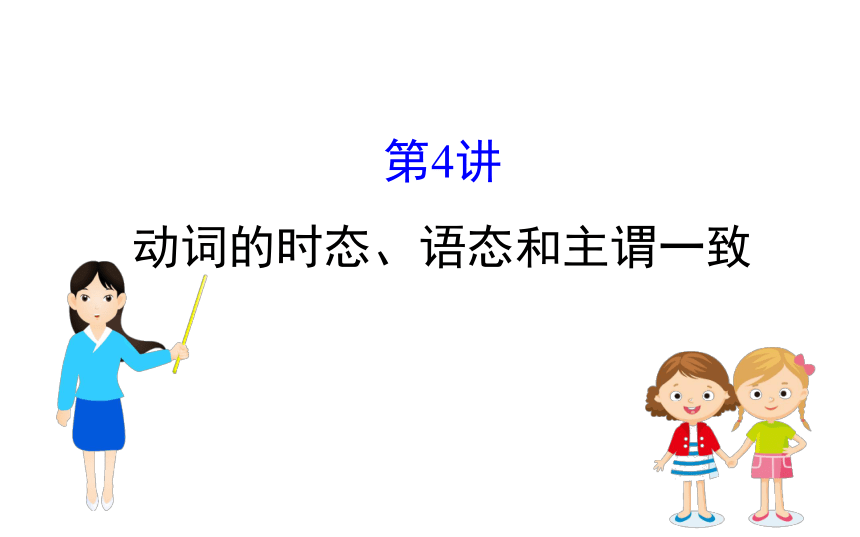 | |
| 格式 | pptx | ||
| 文件大小 | 4.1MB | ||
| 资源类型 | 教案 | ||
| 版本资源 | 通用版 | ||
| 科目 | 英语 | ||
| 更新时间 | 2020-08-10 08:41:27 | ||
图片预览

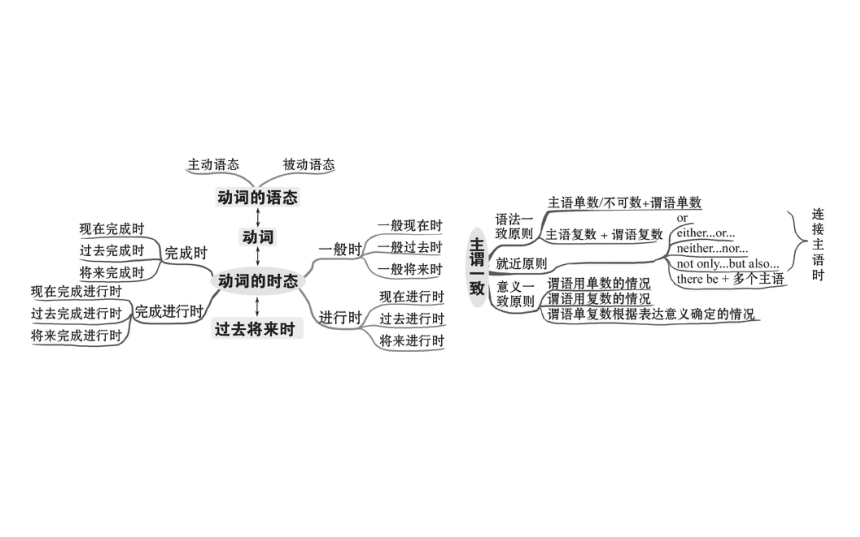
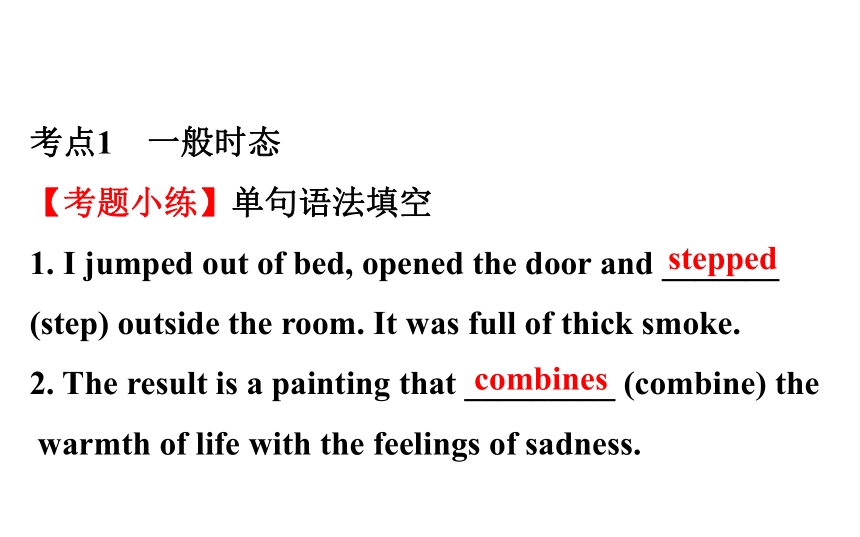
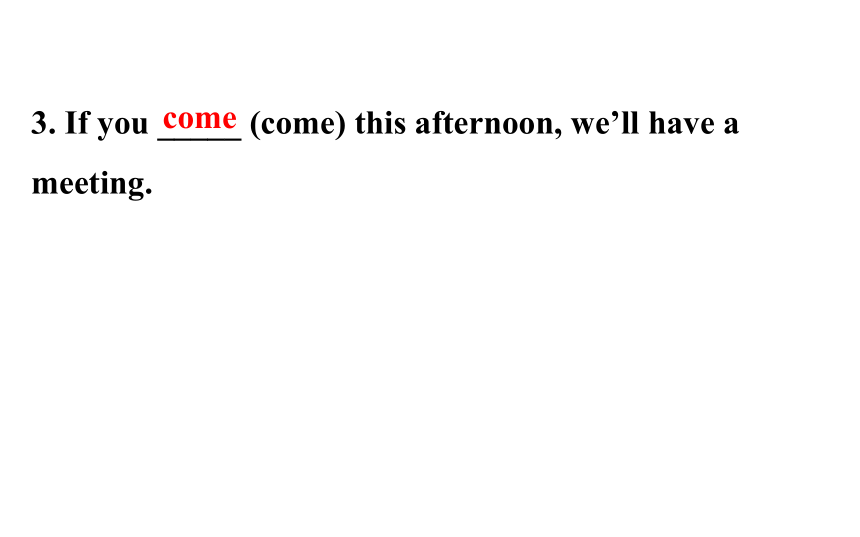
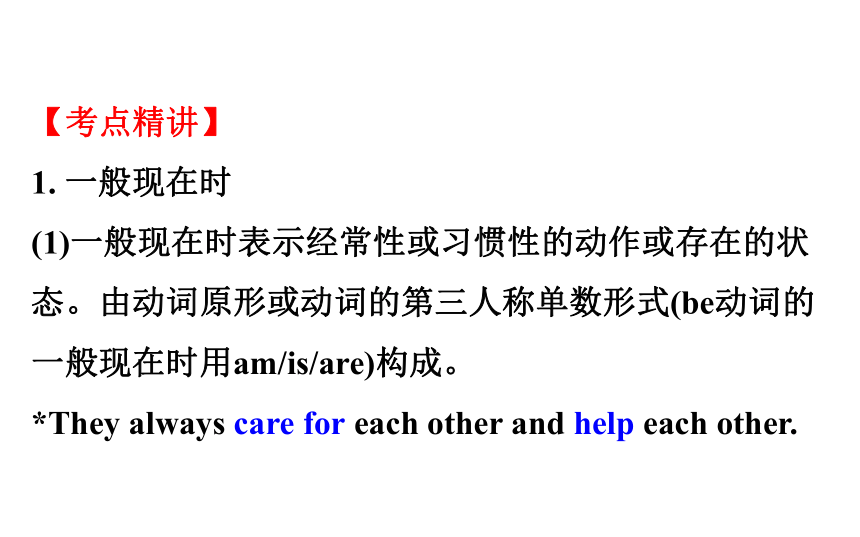
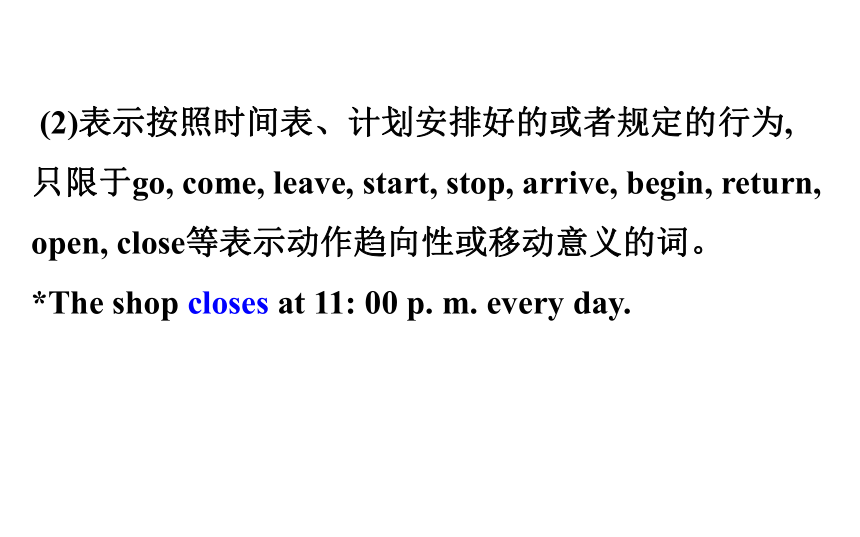
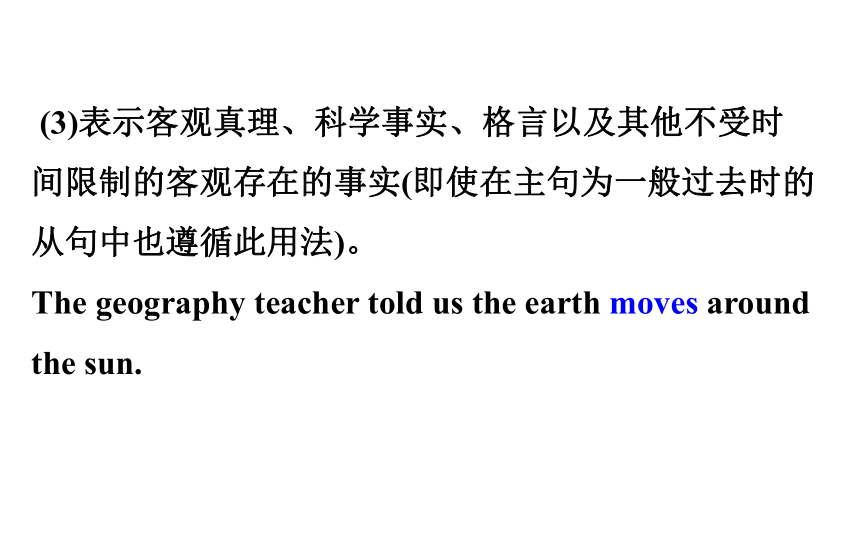
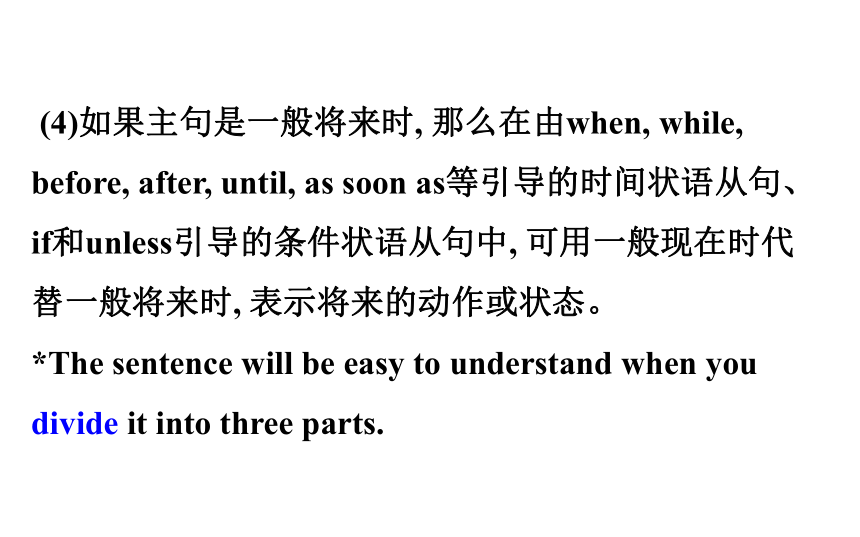
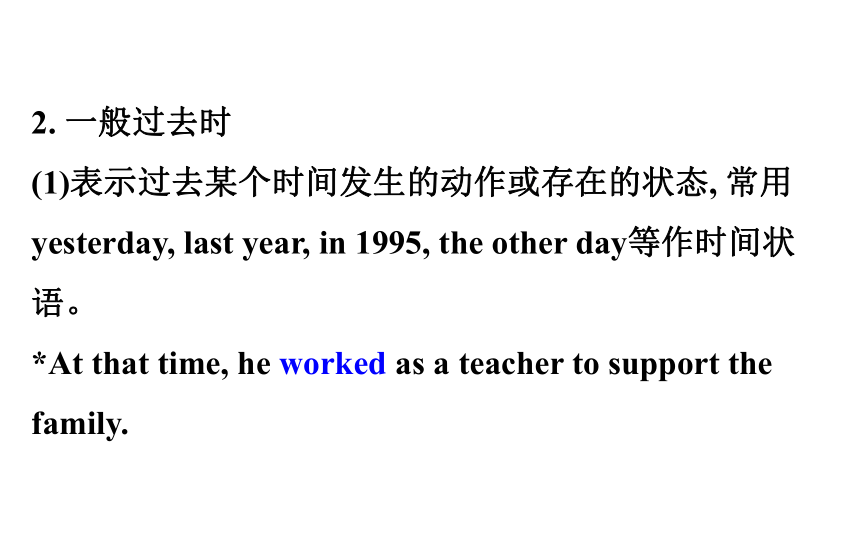
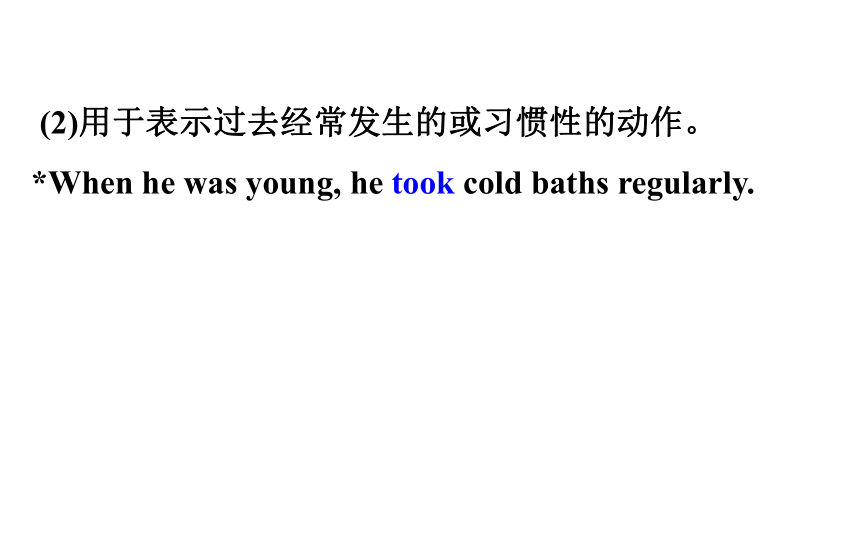
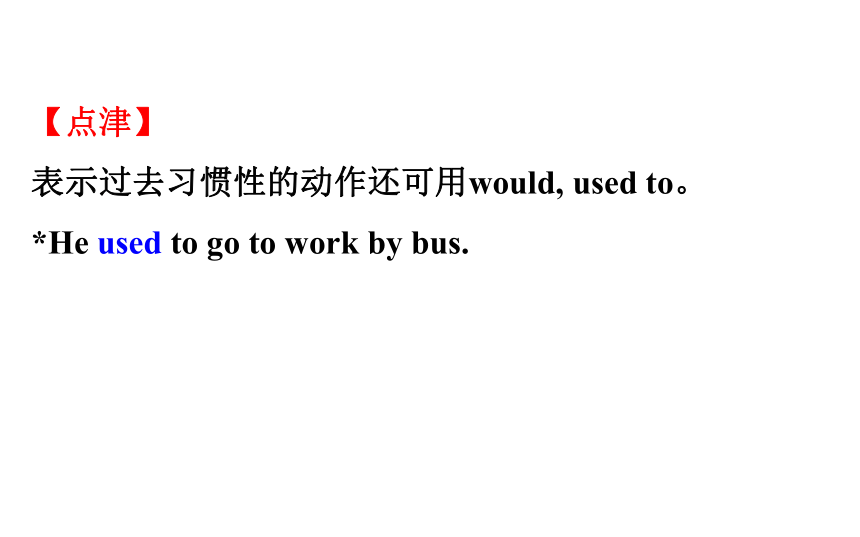
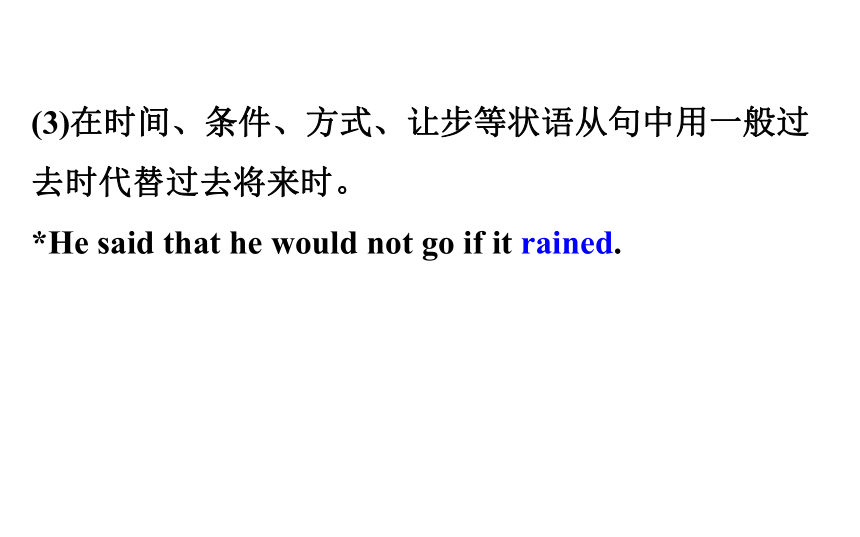
文档简介
第4讲
动词的时态、语态和主谓一致
考点1 一般时态
【考题小练】单句语法填空
1. I jumped out of bed, opened the door and _______
(step) outside the room. It was full of thick smoke.
2. The result is a painting that _________ (combine) the
warmth of life with the feelings of sadness.
stepped
combines
3. If you _____ (come) this afternoon, we’ll have a
meeting.
come
【考点精讲】
1. 一般现在时
(1)一般现在时表示经常性或习惯性的动作或存在的状态。由动词原形或动词的第三人称单数形式(be动词的一般现在时用am/is/are)构成。
*They always care for each other and help each other.
(2)表示按照时间表、计划安排好的或者规定的行为, 只限于go, come, leave, start, stop, arrive, begin, return, open, close等表示动作趋向性或移动意义的词。
*The shop closes at 11: 00 p. m. every day.
(3)表示客观真理、科学事实、格言以及其他不受时间限制的客观存在的事实(即使在主句为一般过去时的从句中也遵循此用法)。
The geography teacher told us the earth moves around the sun.
(4)如果主句是一般将来时, 那么在由when, while, before, after, until, as soon as等引导的时间状语从句、if和unless引导的条件状语从句中, 可用一般现在时代替一般将来时, 表示将来的动作或状态。
*The sentence will be easy to understand when you divide it into three parts.
2. 一般过去时
(1)表示过去某个时间发生的动作或存在的状态, 常用yesterday, last year, in 1995, the other day等作时间状语。
*At that time, he worked as a teacher to support the family.
(2)用于表示过去经常发生的或习惯性的动作。
*When he was young, he took cold baths regularly.
【点津】
表示过去习惯性的动作还可用would, used to。
*He used to go to work by bus.
(3)在时间、条件、方式、让步等状语从句中用一般过去时代替过去将来时。
*He said that he would not go if it rained.
(4)表示两个紧接着发生的动作, 常用一般过去时, 由but, and, when, as soon as, immediately, the moment, the minute等连接。
*He bought a watch but lost it.
*The moment she came in, she told me what had happened to her.
(5)常用一般过去时的句型。
*Why didn’t you think of that?
*I didn’t notice it.
【题组训练】单句语法填空
1. Instead, enjoy each one of your blessings and each
moment that life _____ (give) you.
2. In Tsinghua, he met his wife Yang Jiang, who was to
become a successful playwright and translator, and
_______ (marry) her in 1935.
gives
married
3. Having a talent for languages, Marco Polo learned
to speak Mongolian and Chinese. Later under the
orders of Kublai Khan, he ________________ (travel)
far and wide across China.
4. However, as it _____ (turn) out, an internal(内部
的)clock helps young sunflowers track the sun so that
they can grow better.
travelled/traveled
turns
考点2 进行时态
【考题小练】单句语法填空
1. Sally ________(take) some courses at university, so
she can’t work full time at the moment.
2. Whether he _____________(educate) the world with
his knowledge of the universe, or making fun of
himself in TV shows, it is hard to imagine what the
world will be like now Hawking is no longer in.
is taking
was educating
3. Jane can’t attend the meeting at 3 o’clock this
afternoon because she ______________(teach) a class
at that time.
will be teaching
【考点精讲】
1. 现在进行时
(1)表示说话时正在进行的动作或发生的事; 表示现阶段正在进行的动作或发生的事。
*Hurry up! We’re all waiting for you.
(2)表示近期特定的安排或计划。
*I am meeting Mr Wang tonight.
(3)表示位置转移的动词可用进行时代替将来时。这样的动词有go, come, start, leave, arrive, begin, return等。
*My aunt is leaving for Shanghai at 11: 00 tomorrow morning.
(4)现在进行时与always, often, forever等连用表示赞扬、厌烦等语气。
*You are always changing your mind.
【点津】不宜用现在进行时的常见动词:
①表示心理状态、情感的动词: like, love, hate, care, remember, believe, want, mind, wish, agree, mean, need等。
②表示存在状态的动词: appear, exist, lie, remain, seem, belong to等。
③表示行为结果的动词: allow, accept, permit, promise, admit, complete等。
④表示感官的动词: see, hear, notice, feel, smell, sound, taste, look等。
2. 过去进行时
(1)表示过去某一时刻正在进行的动作或某一段时间内一直在进行的动作。
*What was she doing at nine o’clock yesterday evening?
(2)表示过去的一个动作发生时另一个动作正在进行或表示过去的两个动作同时进行。
*When I came home, she was cooking dinner.
【点津】在复合句中, 如果主句动作和从句动作都是延续性的或同时发生的, 那么主从句的动词都可用过去进行时。
3. 将来进行时
表示将来某个时刻或阶段正在发生的动作或存在的状态。将来进行时常与一些标志性的时间状语连用。这些常见的标志性的时间状语有this time tomorrow, from 1: 30 p. m. to 4: 30 p. m. , the day after tomorrow等。
*I’ll be flying to Beijing at two o’clock this afternoon.
【题组训练】单句语法填空
1. Give your whole attention to what you _________
(do).
2. Terry and his wife ____________(clean) their new
home busily when the light suddenly went out.
are doing
were cleaning
3. You’d better not call the manager between 7 and 8
this evening, for he ____________(have) an important
meeting then.
4. One of them said three young men stole her friend’s
purse while they _____________(shop) in a store. ?
will be having
were shopping
5. When you reach the other end of the bridge, I ____
_________(wait) right there to show you the way.
will
be waiting
考点3 将来时态
【考题小练】单句语法填空
1. Overweight children and teenagers aged between 5
and 18 in the China mainland _________(reach) 8. 5
million in 2015, a number that surpass(超过) the
population of Spain, a study said.
will reach
2. He hoped that the students __________(keep)
hungry for knowledge and develop their national spirit.
3. Lincoln said, “Give me six hours to chop down a
tree, and I _________(spend) the first four hours
sharpening the axe. ”?
would keep
will spend
【考点精讲】
1. 一般将来时
(1)一般将来时表示将来某一时刻的动作或状态, 即单纯的将来事实。
*We will have a meeting tomorrow.
(2)表示临时性的决定。
*—Tom is ill and now in hospital.
—Really? I’ll see him.
(3)三种表示一般将来时的特殊结构:
①be going to do sth. 表示计划、打算要做某事或者有预兆要发生某事。
*The railway is going to be open on October 1st.
*Look at the dark clouds. It’s going to rain.
②be to do sth. 表示按计划或安排即将做某事, 或者按照职责、义务、规定等要做某事。
*A meeting is to be held at 3 o’clock this afternoon.
③be about to do sth. 表示即将发生某事。该结构通常不与具体的时间状语连用。
*Autumn harvest is about to start.
2. 过去将来时
过去将来时表示在过去某个时间看将要发生的动作或存在的状态, 即过去将来时是“立足过去, 着眼未来”的一种时态, 常用于宾语从句中。
*In Berlin, he first met the woman whom he would one day marry.
【题组训练】单句语法填空
1. He spent the rest of the day in panic, fearing what
________________________________(happen) when
Davis told his mother.
2. In summary, I think we _________(defeat) smoking
with our struggle and determination.
would happen (might/could happen)
will defeat
3. If you give up in winter, you ________ (miss) the hope
of spring, the beauty of summer, and the harvest of
autumn in your life.
will miss
考点4 完成时态
【考题小练】单句语法填空
1. When it comes to describing companies, business
students ___________(name) Bank of China the top
choice for seven years, and it shows no signs of giving
up its lead.
have named
2. To our great relief, the exam turned out to be not so
difficult as we ____________(imagine).
3. It is reported that China _________________
(complete) its first orbiting space station by around
2022.
had imagined
will have completed
4. Tom __________________________(work) in the
library every night over the last three months.
has been working/has worked
【考点精讲】
1. 现在完成时
(1)表示过去发生或完成的某个动作对现在造成的影响或产生的结果, 强调的是这个影响或结果, 常与yet, already, just, before, lately等时间状语连用。
*I have just turned off the light.
(2) 表示开始于过去、持续到现在并可能持续下去的动作或状态, 常与“since+时间点”、“for+时间段”及how long, (ever) since, ever, before, so far, in the last/past few years, up to now, till now等时间状语连用。
*They have been good friends since they met at a meeting.
(3)在条件、时间、让步状语从句中, 表示将来某时已完成的动作。
*I shall post the letter as soon as I have written it.
(4)下列句型中常用现在完成时:
①It is(has been)+一段时间+since从句(从句用一般过去时)
②This (That/It) is the first(second. . . )time+that从句(从句用现在完成时)
③This (That/It) is the best/finest/most interesting. . . +that从句(从句用现在完成时)
*This is the first time that we have seen a film in the cinema together as a family.
【点津】上述句型中的is如果改为was, 则现在完成时也要相应地改为过去完成时。
2. 过去完成时
(1)表示在过去某一时刻或某一动作之前已经完成的动作, 时间定位是“过去的过去”。句中一般有明确的表示“过去的过去”的时间状语(从句), 如by, by the end of, by the time, until, when, before等引出的表示过去的时间状语(从句)。但有时需要通过上下文来判断。
*By the time he was twelve, Edison had begun to make a living by himself.
(2)有些动词有时用过去完成时表示过去未曾实现的愿望或打算。这类动词常见的有hope, plan, mean, expect, intend, suppose, want, think等。
*I had hoped to come to help you. Something happened to me. That’s why I didn’t come.
(3)用在hardly/scarcely/rarely. . . when. . . 和no sooner. . . than. . . 句型中, 主句常用过去完成时, 表示“一……就……; 刚……就……”。hardly/scarcely/rarely/no sooner置于句首时, 主句部分倒装, 从句不倒装。
*We had no sooner been seated than the bus started.
=No sooner had we been seated than the bus started.
3. 将来完成时
表示在将来某时/某动作之前已经完成的动作。常与时间状语“by/before + 将来时间”等连用。
*By this time tomorrow you will have arrived in Shenyang.
4. 现在完成进行时
(1)表示从过去某时开始一直持续到现在并且还要继续下去的动作。
*The girl has a great interest in sports and has been taking badminton classes twice a week over the last three years.
(2)表示到目前为止的一段时间里一直反复进行的动作。
*I have been calling him many times this morning, but there’s no answer.
【题组训练】单句语法填空
1. I __________(grow) not only physically, but also
mentally in the past few years.
2. Over the last few years, learning Chinese ___
_______ (become) popular among people all over the
world.
have grown
has
become
3. When all of them returned home, they were called
together to describe what they ________(see).
4. Besides high-speed rail, China ____________
(improve) people’s lives in many other innovative (创
新的) ways over the last decade. ?
had seen
has improved
考点5 被动语态
【考题小练】单句语法填空
1. It __________(report) that many people die of
traffic accidents each year.
2. Nowadays, cellphones have features such as games,
music and calendars and more new functions ___
___________(add).
is reported
are
being added
3. We won’t start the work until all the preparations
______________(make).
4. This kind of wool shirt ____ (feel) soft and ____ (sell)
well.
have been made
feels
sells
【考点精讲】
1. 被动语态的构成(以do为例)
时
体
现在
过去
将来
过去将来
一般
is/am/
are done
was/were
done
will/shall
be done
would/should
be done
时
体
现在
过去
将来
过去将来
进行
is/am/are
being done
was/were
being done
-
-
完成
have/has
been done
had been
done
will/shall
have been
done
would/should
have been
done
2. 被动语态的用法
(1)不知道谁是动作的执行者, 或没有必要指明谁是动作的执行者。
*—The window is dirty.
—I know. It hasn’t been cleaned for weeks.
(2)需要强调或突出动作的承受者或事件本身。
*All the employees except the manager are encouraged to work online at home.
【点津】被动语态还用于一些固定句式中
It is hoped that . . . 希望……
It is supposed that . . . 据推测说……
It is known that . . . 据说……
It is believed that . . . 有人相信……
It is thought that . . . 人们认为……
3. 不能用被动语态的几种情况
(1)所有的不及物动词或不及物动词词组。
(2)表示状态的谓语动词, 如last, hold, contain, fit, cost等。
(3)表示归属的动词(短语), 如have, own, belong to等。
(4)表示“希望、意图、喜好”的动词, 如wish, want, hope, like, love, hate等。
(5)宾语是反身代词或相互代词时谓语动词用主动语态, 不能用被动语态。
(6)宾语是同源宾语、不定式、动名词等, 谓语动词不用被动语态。
4. 主动形式表示被动意义
(1)当feel, look, smell, taste, sound等后面接形容词时; 当cut, read, sell, wear, write, wash等作为不及物动词表示主语内在“品质”或“性能”时; 当动词表示“开始、结束、关、停、转、启动”等意义时。
*The flowers smell sweet.
(2)当break out, take place, shut off, turn off, work out等动词短语表示“发生、关闭、制定”等意思时。
*The plan worked out successfully.
使用被动语态时应注意的几个问题
(1)主动变为被动时双宾语的变化。
*My friend gave me an interesting book on my birthday.
→An interesting book was given to me (by my friend) on my birthday.
→I was given an interesting book (by my friend) on my birthday.
(2)主动变为被动时, 宾语成主语; (作补语的)不定式前需加to(位置不变)。
*The boss made him work all day long.
→He was made to work all day long (by the boss).
(3)短语动词变被动语态时, 勿掉“尾巴”。
*Your pronunciation and spelling should be paid attention to.
(4)情态动词, be going to, be to, be sure to等结构变为被动语态时, 只需将它们后面的动词原形变为“be+过去分词”。
*We can repair this watch in two days.
→This watch can be repaired in two days.
(5)get+过去分词构成的表示被动的短语get paid/lost/hurt等。
*We get paid every week.
【题组训练】单句语法填空
1. Two months later, a reply from Buckingham Palace
___________(receive).
2. They arrived at Bill’s home first and Mark
__________(invite) in for a Coke and to watch some
television.
was received
was invited
3. But when one Milwaukee bus driver saw a child on
the street needed help, she stopped everything and now
she __________(regard) as a hero for it.
4. Should tourists __________(allow) to visit polar
regions? ?
5. All his life, he _________(stick) in his house taken
care of by his mother. ?
is regarded
be allowed
was stuck
考点6 主谓一致
【考题小练】单句语法填空
1. So far, large quantities of information _________
____ (send) to the company by e-mail, which has a
great effect on improving the quality of its products.
have been
sent
2. What her father left her ___ (be) only some books.
3. A perfect gift with many flowers ____________(send)
to the beautiful girl, so she is very happy now.
are
has been sent
【考点精讲】
1. 语法一致原则
主语的单复数决定了谓语动词的单复数。
(1)动名词、动词不定式、从句、不定代词作主语时, 谓语动词常用单数。
*Listening to music makes me relaxed after a busy day.
【点津】what引导的从句作主语时, 谓语动词一般用单数形式, 但如果从句表示复数意义, 则谓语动词用复数形式。
*What he said is far from the truth.
*What the school needs are qualified teachers.
(2)主语后有with, together with, along with, except, besides, as well as等引起的短语时, 谓语动词的数要与前面的主语保持一致。
*Mr Green together with his children goes to the park every Sunday.
(3)and, both. . . and. . . 连接两个不同的主语时, 谓语动词用复数形式; 但是如果由and连接的两个名词表示同一个人或物, 谓语动词用单数形式。
*Her teacher and her friends are in the sitting room.
*The poet and writer has produced many works.
(4)定语从句中关系代词作主语时, 从句中的谓语动词要与先行词保持一致。
*I have a friend who likes listening to classical music.
(5)“many a/more than one+单数名词”作主语时, 谓语动词用单数。each, every, no所修饰的名词作主语时, 即使由and连接, 谓语动词仍用单数。
*Many a parent has had to go through this same painful process.
(6)在倒装句中谓语常与后面最接近的主语一致。
*In the distance was heard the clapping of hands and the shouts of the people.
2. 意义一致原则
意义一致原则指不管主语的形式是单数还是复数, 主语的意义决定了谓语动词的单复数。
(1)集体名词作主语时, 若被看作一个整体, 谓语动词用单数形式; 若被看作构成集体的一个个成员, 谓语动词用复数形式。常见的集体名词有: family, class, team, group, public, committee, government, audience等。
*The class consists of 25 boys and 20 girls.
*The class are doing an experiment.
(2)“分数/百分数/the majority+of+名词”作主语时, 谓语动词的单复数取决于of后名词的数以及其表示的意义; all, some, half, most, the rest等作主语时, 谓语动词的单复数取决于主语实际表达的意义。
*About one third of the books are worth reading.
*Only 60 percent of the work was done yesterday.
(3)“the+形容词”表示一类人在句中作主语时, 谓语动词用复数形式。
*The sick have been cured and the lost have been found.
(4)表示时间、距离、重量、金额等的复数名词作主语时, 谓语动词通常用单数形式。
*Three thousand dollars is quite a lot of money for a boy.
(5)“more than one+单数名词”和“many a+单数名词”作主语时, 谓语动词用单数。
*More than one student has failed the exam.
*Many a child was playing there.
3. 就近一致原则
就近一致原则指谓语动词的单复数形式取决于离它最近的主语的单复数。
(1)由or, either. . . or. . . , neither. . . nor. . . , not only. . . but also. . . , not. . . but. . . 等连接的短语作主语, 谓语动词的数常与最近的主语保持一致。
*Either you or one of your students is to attend the meeting that is due tomorrow.
(2)由there, here引起的主语不止一个时, 谓语动词的数通常和最邻近的主语保持一致。
*There are three books and a pen on the desk.
【题组训练】单句语法填空
1. The possibility of smoking in the UK increases with
age so that at the age of 15, 8% of school children ___
(be) regular smokers.
2. According to Harmer, sunflowers which ________
(face) with the sun receive more bees and other insects
because they like warm flowers.
are
are faced
3. He says that watching Away from It All _____ (help)
teenagers forget about the pressures of exams and
homework, and the troubles that fill the world today.
4. People in Suzhou, Jiangsu Province, ___ (be)
accustomed to eating wontons in midwinter.
helps
are
【高考试水区】
1. (2018·全国卷Ⅰ) While running regularly can’t
make you live forever, the review says it __ (be) more
effective at lengthening life than walking, cycling or
swimming.
is
2. (2018·全国卷Ⅱ) Since 2011, the country _________
(grow) more corn than rice.
3. (2018·11月浙江高考)You probably _________(use)
caffeine since childhood.
has grown
have used
4. (2018·6月浙江高考) I still remember visiting a
friend who’d lived here for five years and I ____
_______ (shock) when I learnt she hadn’t cooked once
in all that time.
5. (2018·江苏高考)I was sent to the village last month
to see how the development plan _______________
(carry) out in the past two years.
shocked
had been carried
was
6. (2018·江苏高考)Hopefully in 2025 we will no longer
be e-mailing each other, for we _________________
(develop) more convenient electronic communication
tools by then.
will have developed
7. (2018·北京高考)Susan had quit her well-paid job
and ___________(work) as a volunteer in the
neighborhood when I visited her last year.
was working
8. (2018·天津高考)My washing machine _______
________ (repair) this week, so I have to wash my
clothes by hand.
is being
repaired
【微技能点拨】
1. 掌握独特的时间状语标志
(1)看到always, often, seldom, sometimes, usually等要想到用一般现在时;
(2)看到yesterday, last night, a few days ago, the other day等要想到用一般过去时;
(3)看到tomorrow, next year, in a week等要想到用一般将来时;
(4)看到now, at present等要想到用现在进行时;
(5)看到at that time, then, at six o’clock yesterday等要想到用过去进行时;
(6)看到this time tomorrow, from 1 o’clock to 3 o’clock tomorrow等要想到用将来进行时;
(7)看到since, so far, up to now, in the last/past few years等要想到用现在完成时。
2. 熟记固定句型中的时态
(1)be doing. . . when. . . , 主句常用过去进行时, 从句常用一般过去时;
(2)It is/has been+时间段+since. . . 表示“自从……以来已经……”, 主句用现在完成时或一般现在时, 从句用一般过去时;
(3)祈使句+and/or+陈述句, 陈述句常用一般将来时。
3. 分清主动被动, 辨析语态
看到动词为及物动词, 后面缺少宾语要想到用被动语态。
动词的时态、语态和主谓一致
考点1 一般时态
【考题小练】单句语法填空
1. I jumped out of bed, opened the door and _______
(step) outside the room. It was full of thick smoke.
2. The result is a painting that _________ (combine) the
warmth of life with the feelings of sadness.
stepped
combines
3. If you _____ (come) this afternoon, we’ll have a
meeting.
come
【考点精讲】
1. 一般现在时
(1)一般现在时表示经常性或习惯性的动作或存在的状态。由动词原形或动词的第三人称单数形式(be动词的一般现在时用am/is/are)构成。
*They always care for each other and help each other.
(2)表示按照时间表、计划安排好的或者规定的行为, 只限于go, come, leave, start, stop, arrive, begin, return, open, close等表示动作趋向性或移动意义的词。
*The shop closes at 11: 00 p. m. every day.
(3)表示客观真理、科学事实、格言以及其他不受时间限制的客观存在的事实(即使在主句为一般过去时的从句中也遵循此用法)。
The geography teacher told us the earth moves around the sun.
(4)如果主句是一般将来时, 那么在由when, while, before, after, until, as soon as等引导的时间状语从句、if和unless引导的条件状语从句中, 可用一般现在时代替一般将来时, 表示将来的动作或状态。
*The sentence will be easy to understand when you divide it into three parts.
2. 一般过去时
(1)表示过去某个时间发生的动作或存在的状态, 常用yesterday, last year, in 1995, the other day等作时间状语。
*At that time, he worked as a teacher to support the family.
(2)用于表示过去经常发生的或习惯性的动作。
*When he was young, he took cold baths regularly.
【点津】
表示过去习惯性的动作还可用would, used to。
*He used to go to work by bus.
(3)在时间、条件、方式、让步等状语从句中用一般过去时代替过去将来时。
*He said that he would not go if it rained.
(4)表示两个紧接着发生的动作, 常用一般过去时, 由but, and, when, as soon as, immediately, the moment, the minute等连接。
*He bought a watch but lost it.
*The moment she came in, she told me what had happened to her.
(5)常用一般过去时的句型。
*Why didn’t you think of that?
*I didn’t notice it.
【题组训练】单句语法填空
1. Instead, enjoy each one of your blessings and each
moment that life _____ (give) you.
2. In Tsinghua, he met his wife Yang Jiang, who was to
become a successful playwright and translator, and
_______ (marry) her in 1935.
gives
married
3. Having a talent for languages, Marco Polo learned
to speak Mongolian and Chinese. Later under the
orders of Kublai Khan, he ________________ (travel)
far and wide across China.
4. However, as it _____ (turn) out, an internal(内部
的)clock helps young sunflowers track the sun so that
they can grow better.
travelled/traveled
turns
考点2 进行时态
【考题小练】单句语法填空
1. Sally ________(take) some courses at university, so
she can’t work full time at the moment.
2. Whether he _____________(educate) the world with
his knowledge of the universe, or making fun of
himself in TV shows, it is hard to imagine what the
world will be like now Hawking is no longer in.
is taking
was educating
3. Jane can’t attend the meeting at 3 o’clock this
afternoon because she ______________(teach) a class
at that time.
will be teaching
【考点精讲】
1. 现在进行时
(1)表示说话时正在进行的动作或发生的事; 表示现阶段正在进行的动作或发生的事。
*Hurry up! We’re all waiting for you.
(2)表示近期特定的安排或计划。
*I am meeting Mr Wang tonight.
(3)表示位置转移的动词可用进行时代替将来时。这样的动词有go, come, start, leave, arrive, begin, return等。
*My aunt is leaving for Shanghai at 11: 00 tomorrow morning.
(4)现在进行时与always, often, forever等连用表示赞扬、厌烦等语气。
*You are always changing your mind.
【点津】不宜用现在进行时的常见动词:
①表示心理状态、情感的动词: like, love, hate, care, remember, believe, want, mind, wish, agree, mean, need等。
②表示存在状态的动词: appear, exist, lie, remain, seem, belong to等。
③表示行为结果的动词: allow, accept, permit, promise, admit, complete等。
④表示感官的动词: see, hear, notice, feel, smell, sound, taste, look等。
2. 过去进行时
(1)表示过去某一时刻正在进行的动作或某一段时间内一直在进行的动作。
*What was she doing at nine o’clock yesterday evening?
(2)表示过去的一个动作发生时另一个动作正在进行或表示过去的两个动作同时进行。
*When I came home, she was cooking dinner.
【点津】在复合句中, 如果主句动作和从句动作都是延续性的或同时发生的, 那么主从句的动词都可用过去进行时。
3. 将来进行时
表示将来某个时刻或阶段正在发生的动作或存在的状态。将来进行时常与一些标志性的时间状语连用。这些常见的标志性的时间状语有this time tomorrow, from 1: 30 p. m. to 4: 30 p. m. , the day after tomorrow等。
*I’ll be flying to Beijing at two o’clock this afternoon.
【题组训练】单句语法填空
1. Give your whole attention to what you _________
(do).
2. Terry and his wife ____________(clean) their new
home busily when the light suddenly went out.
are doing
were cleaning
3. You’d better not call the manager between 7 and 8
this evening, for he ____________(have) an important
meeting then.
4. One of them said three young men stole her friend’s
purse while they _____________(shop) in a store. ?
will be having
were shopping
5. When you reach the other end of the bridge, I ____
_________(wait) right there to show you the way.
will
be waiting
考点3 将来时态
【考题小练】单句语法填空
1. Overweight children and teenagers aged between 5
and 18 in the China mainland _________(reach) 8. 5
million in 2015, a number that surpass(超过) the
population of Spain, a study said.
will reach
2. He hoped that the students __________(keep)
hungry for knowledge and develop their national spirit.
3. Lincoln said, “Give me six hours to chop down a
tree, and I _________(spend) the first four hours
sharpening the axe. ”?
would keep
will spend
【考点精讲】
1. 一般将来时
(1)一般将来时表示将来某一时刻的动作或状态, 即单纯的将来事实。
*We will have a meeting tomorrow.
(2)表示临时性的决定。
*—Tom is ill and now in hospital.
—Really? I’ll see him.
(3)三种表示一般将来时的特殊结构:
①be going to do sth. 表示计划、打算要做某事或者有预兆要发生某事。
*The railway is going to be open on October 1st.
*Look at the dark clouds. It’s going to rain.
②be to do sth. 表示按计划或安排即将做某事, 或者按照职责、义务、规定等要做某事。
*A meeting is to be held at 3 o’clock this afternoon.
③be about to do sth. 表示即将发生某事。该结构通常不与具体的时间状语连用。
*Autumn harvest is about to start.
2. 过去将来时
过去将来时表示在过去某个时间看将要发生的动作或存在的状态, 即过去将来时是“立足过去, 着眼未来”的一种时态, 常用于宾语从句中。
*In Berlin, he first met the woman whom he would one day marry.
【题组训练】单句语法填空
1. He spent the rest of the day in panic, fearing what
________________________________(happen) when
Davis told his mother.
2. In summary, I think we _________(defeat) smoking
with our struggle and determination.
would happen (might/could happen)
will defeat
3. If you give up in winter, you ________ (miss) the hope
of spring, the beauty of summer, and the harvest of
autumn in your life.
will miss
考点4 完成时态
【考题小练】单句语法填空
1. When it comes to describing companies, business
students ___________(name) Bank of China the top
choice for seven years, and it shows no signs of giving
up its lead.
have named
2. To our great relief, the exam turned out to be not so
difficult as we ____________(imagine).
3. It is reported that China _________________
(complete) its first orbiting space station by around
2022.
had imagined
will have completed
4. Tom __________________________(work) in the
library every night over the last three months.
has been working/has worked
【考点精讲】
1. 现在完成时
(1)表示过去发生或完成的某个动作对现在造成的影响或产生的结果, 强调的是这个影响或结果, 常与yet, already, just, before, lately等时间状语连用。
*I have just turned off the light.
(2) 表示开始于过去、持续到现在并可能持续下去的动作或状态, 常与“since+时间点”、“for+时间段”及how long, (ever) since, ever, before, so far, in the last/past few years, up to now, till now等时间状语连用。
*They have been good friends since they met at a meeting.
(3)在条件、时间、让步状语从句中, 表示将来某时已完成的动作。
*I shall post the letter as soon as I have written it.
(4)下列句型中常用现在完成时:
①It is(has been)+一段时间+since从句(从句用一般过去时)
②This (That/It) is the first(second. . . )time+that从句(从句用现在完成时)
③This (That/It) is the best/finest/most interesting. . . +that从句(从句用现在完成时)
*This is the first time that we have seen a film in the cinema together as a family.
【点津】上述句型中的is如果改为was, 则现在完成时也要相应地改为过去完成时。
2. 过去完成时
(1)表示在过去某一时刻或某一动作之前已经完成的动作, 时间定位是“过去的过去”。句中一般有明确的表示“过去的过去”的时间状语(从句), 如by, by the end of, by the time, until, when, before等引出的表示过去的时间状语(从句)。但有时需要通过上下文来判断。
*By the time he was twelve, Edison had begun to make a living by himself.
(2)有些动词有时用过去完成时表示过去未曾实现的愿望或打算。这类动词常见的有hope, plan, mean, expect, intend, suppose, want, think等。
*I had hoped to come to help you. Something happened to me. That’s why I didn’t come.
(3)用在hardly/scarcely/rarely. . . when. . . 和no sooner. . . than. . . 句型中, 主句常用过去完成时, 表示“一……就……; 刚……就……”。hardly/scarcely/rarely/no sooner置于句首时, 主句部分倒装, 从句不倒装。
*We had no sooner been seated than the bus started.
=No sooner had we been seated than the bus started.
3. 将来完成时
表示在将来某时/某动作之前已经完成的动作。常与时间状语“by/before + 将来时间”等连用。
*By this time tomorrow you will have arrived in Shenyang.
4. 现在完成进行时
(1)表示从过去某时开始一直持续到现在并且还要继续下去的动作。
*The girl has a great interest in sports and has been taking badminton classes twice a week over the last three years.
(2)表示到目前为止的一段时间里一直反复进行的动作。
*I have been calling him many times this morning, but there’s no answer.
【题组训练】单句语法填空
1. I __________(grow) not only physically, but also
mentally in the past few years.
2. Over the last few years, learning Chinese ___
_______ (become) popular among people all over the
world.
have grown
has
become
3. When all of them returned home, they were called
together to describe what they ________(see).
4. Besides high-speed rail, China ____________
(improve) people’s lives in many other innovative (创
新的) ways over the last decade. ?
had seen
has improved
考点5 被动语态
【考题小练】单句语法填空
1. It __________(report) that many people die of
traffic accidents each year.
2. Nowadays, cellphones have features such as games,
music and calendars and more new functions ___
___________(add).
is reported
are
being added
3. We won’t start the work until all the preparations
______________(make).
4. This kind of wool shirt ____ (feel) soft and ____ (sell)
well.
have been made
feels
sells
【考点精讲】
1. 被动语态的构成(以do为例)
时
体
现在
过去
将来
过去将来
一般
is/am/
are done
was/were
done
will/shall
be done
would/should
be done
时
体
现在
过去
将来
过去将来
进行
is/am/are
being done
was/were
being done
-
-
完成
have/has
been done
had been
done
will/shall
have been
done
would/should
have been
done
2. 被动语态的用法
(1)不知道谁是动作的执行者, 或没有必要指明谁是动作的执行者。
*—The window is dirty.
—I know. It hasn’t been cleaned for weeks.
(2)需要强调或突出动作的承受者或事件本身。
*All the employees except the manager are encouraged to work online at home.
【点津】被动语态还用于一些固定句式中
It is hoped that . . . 希望……
It is supposed that . . . 据推测说……
It is known that . . . 据说……
It is believed that . . . 有人相信……
It is thought that . . . 人们认为……
3. 不能用被动语态的几种情况
(1)所有的不及物动词或不及物动词词组。
(2)表示状态的谓语动词, 如last, hold, contain, fit, cost等。
(3)表示归属的动词(短语), 如have, own, belong to等。
(4)表示“希望、意图、喜好”的动词, 如wish, want, hope, like, love, hate等。
(5)宾语是反身代词或相互代词时谓语动词用主动语态, 不能用被动语态。
(6)宾语是同源宾语、不定式、动名词等, 谓语动词不用被动语态。
4. 主动形式表示被动意义
(1)当feel, look, smell, taste, sound等后面接形容词时; 当cut, read, sell, wear, write, wash等作为不及物动词表示主语内在“品质”或“性能”时; 当动词表示“开始、结束、关、停、转、启动”等意义时。
*The flowers smell sweet.
(2)当break out, take place, shut off, turn off, work out等动词短语表示“发生、关闭、制定”等意思时。
*The plan worked out successfully.
使用被动语态时应注意的几个问题
(1)主动变为被动时双宾语的变化。
*My friend gave me an interesting book on my birthday.
→An interesting book was given to me (by my friend) on my birthday.
→I was given an interesting book (by my friend) on my birthday.
(2)主动变为被动时, 宾语成主语; (作补语的)不定式前需加to(位置不变)。
*The boss made him work all day long.
→He was made to work all day long (by the boss).
(3)短语动词变被动语态时, 勿掉“尾巴”。
*Your pronunciation and spelling should be paid attention to.
(4)情态动词, be going to, be to, be sure to等结构变为被动语态时, 只需将它们后面的动词原形变为“be+过去分词”。
*We can repair this watch in two days.
→This watch can be repaired in two days.
(5)get+过去分词构成的表示被动的短语get paid/lost/hurt等。
*We get paid every week.
【题组训练】单句语法填空
1. Two months later, a reply from Buckingham Palace
___________(receive).
2. They arrived at Bill’s home first and Mark
__________(invite) in for a Coke and to watch some
television.
was received
was invited
3. But when one Milwaukee bus driver saw a child on
the street needed help, she stopped everything and now
she __________(regard) as a hero for it.
4. Should tourists __________(allow) to visit polar
regions? ?
5. All his life, he _________(stick) in his house taken
care of by his mother. ?
is regarded
be allowed
was stuck
考点6 主谓一致
【考题小练】单句语法填空
1. So far, large quantities of information _________
____ (send) to the company by e-mail, which has a
great effect on improving the quality of its products.
have been
sent
2. What her father left her ___ (be) only some books.
3. A perfect gift with many flowers ____________(send)
to the beautiful girl, so she is very happy now.
are
has been sent
【考点精讲】
1. 语法一致原则
主语的单复数决定了谓语动词的单复数。
(1)动名词、动词不定式、从句、不定代词作主语时, 谓语动词常用单数。
*Listening to music makes me relaxed after a busy day.
【点津】what引导的从句作主语时, 谓语动词一般用单数形式, 但如果从句表示复数意义, 则谓语动词用复数形式。
*What he said is far from the truth.
*What the school needs are qualified teachers.
(2)主语后有with, together with, along with, except, besides, as well as等引起的短语时, 谓语动词的数要与前面的主语保持一致。
*Mr Green together with his children goes to the park every Sunday.
(3)and, both. . . and. . . 连接两个不同的主语时, 谓语动词用复数形式; 但是如果由and连接的两个名词表示同一个人或物, 谓语动词用单数形式。
*Her teacher and her friends are in the sitting room.
*The poet and writer has produced many works.
(4)定语从句中关系代词作主语时, 从句中的谓语动词要与先行词保持一致。
*I have a friend who likes listening to classical music.
(5)“many a/more than one+单数名词”作主语时, 谓语动词用单数。each, every, no所修饰的名词作主语时, 即使由and连接, 谓语动词仍用单数。
*Many a parent has had to go through this same painful process.
(6)在倒装句中谓语常与后面最接近的主语一致。
*In the distance was heard the clapping of hands and the shouts of the people.
2. 意义一致原则
意义一致原则指不管主语的形式是单数还是复数, 主语的意义决定了谓语动词的单复数。
(1)集体名词作主语时, 若被看作一个整体, 谓语动词用单数形式; 若被看作构成集体的一个个成员, 谓语动词用复数形式。常见的集体名词有: family, class, team, group, public, committee, government, audience等。
*The class consists of 25 boys and 20 girls.
*The class are doing an experiment.
(2)“分数/百分数/the majority+of+名词”作主语时, 谓语动词的单复数取决于of后名词的数以及其表示的意义; all, some, half, most, the rest等作主语时, 谓语动词的单复数取决于主语实际表达的意义。
*About one third of the books are worth reading.
*Only 60 percent of the work was done yesterday.
(3)“the+形容词”表示一类人在句中作主语时, 谓语动词用复数形式。
*The sick have been cured and the lost have been found.
(4)表示时间、距离、重量、金额等的复数名词作主语时, 谓语动词通常用单数形式。
*Three thousand dollars is quite a lot of money for a boy.
(5)“more than one+单数名词”和“many a+单数名词”作主语时, 谓语动词用单数。
*More than one student has failed the exam.
*Many a child was playing there.
3. 就近一致原则
就近一致原则指谓语动词的单复数形式取决于离它最近的主语的单复数。
(1)由or, either. . . or. . . , neither. . . nor. . . , not only. . . but also. . . , not. . . but. . . 等连接的短语作主语, 谓语动词的数常与最近的主语保持一致。
*Either you or one of your students is to attend the meeting that is due tomorrow.
(2)由there, here引起的主语不止一个时, 谓语动词的数通常和最邻近的主语保持一致。
*There are three books and a pen on the desk.
【题组训练】单句语法填空
1. The possibility of smoking in the UK increases with
age so that at the age of 15, 8% of school children ___
(be) regular smokers.
2. According to Harmer, sunflowers which ________
(face) with the sun receive more bees and other insects
because they like warm flowers.
are
are faced
3. He says that watching Away from It All _____ (help)
teenagers forget about the pressures of exams and
homework, and the troubles that fill the world today.
4. People in Suzhou, Jiangsu Province, ___ (be)
accustomed to eating wontons in midwinter.
helps
are
【高考试水区】
1. (2018·全国卷Ⅰ) While running regularly can’t
make you live forever, the review says it __ (be) more
effective at lengthening life than walking, cycling or
swimming.
is
2. (2018·全国卷Ⅱ) Since 2011, the country _________
(grow) more corn than rice.
3. (2018·11月浙江高考)You probably _________(use)
caffeine since childhood.
has grown
have used
4. (2018·6月浙江高考) I still remember visiting a
friend who’d lived here for five years and I ____
_______ (shock) when I learnt she hadn’t cooked once
in all that time.
5. (2018·江苏高考)I was sent to the village last month
to see how the development plan _______________
(carry) out in the past two years.
shocked
had been carried
was
6. (2018·江苏高考)Hopefully in 2025 we will no longer
be e-mailing each other, for we _________________
(develop) more convenient electronic communication
tools by then.
will have developed
7. (2018·北京高考)Susan had quit her well-paid job
and ___________(work) as a volunteer in the
neighborhood when I visited her last year.
was working
8. (2018·天津高考)My washing machine _______
________ (repair) this week, so I have to wash my
clothes by hand.
is being
repaired
【微技能点拨】
1. 掌握独特的时间状语标志
(1)看到always, often, seldom, sometimes, usually等要想到用一般现在时;
(2)看到yesterday, last night, a few days ago, the other day等要想到用一般过去时;
(3)看到tomorrow, next year, in a week等要想到用一般将来时;
(4)看到now, at present等要想到用现在进行时;
(5)看到at that time, then, at six o’clock yesterday等要想到用过去进行时;
(6)看到this time tomorrow, from 1 o’clock to 3 o’clock tomorrow等要想到用将来进行时;
(7)看到since, so far, up to now, in the last/past few years等要想到用现在完成时。
2. 熟记固定句型中的时态
(1)be doing. . . when. . . , 主句常用过去进行时, 从句常用一般过去时;
(2)It is/has been+时间段+since. . . 表示“自从……以来已经……”, 主句用现在完成时或一般现在时, 从句用一般过去时;
(3)祈使句+and/or+陈述句, 陈述句常用一般将来时。
3. 分清主动被动, 辨析语态
看到动词为及物动词, 后面缺少宾语要想到用被动语态。
